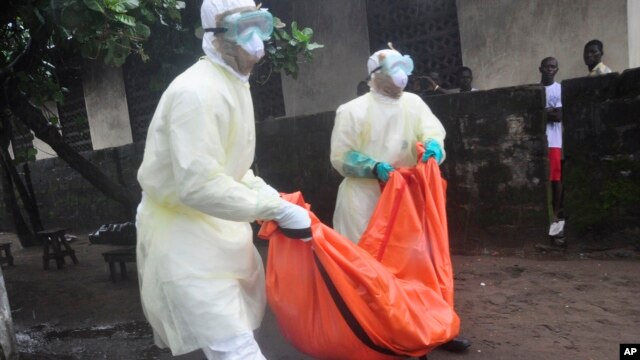
Health care workers in Liberia were to begin a strike Monday to press home their demands for a pay increase and other benefits.
Liberia has the largest number of Ebola infections of any country, including about 2,300 deaths, and some say the strike could deliver a serious blow to the fight against the deadly virus.
According to the World Health Organization, about 95 Liberian health care workers have died so far from Ebola, out of 201 infected.
Alphonsus Wiah, a hygienist with the Island Clinic Ebola Treatment Unit, the largest government-run Ebola center in the capital, Monrovia, said the workers are demanding $700 in monthly hazard pay on top of their monthly salaries of around $200 to $300.
“As you know, this [Ebola] epidemic is not just a normal hospital disease. It is an epidemic that, when you come into contact with it, you expect to either die or survive," Wiah said.
"And, as I speak to you, some of our colleagues, the health workers, are dying. So, our demand was the salary structure that [the] government offered was too low, and we believe there should be an increment in the salary structure,” he added.
No government reply yet
Wiah said no government official has yet made any offer to the workers despite repeated requests.
“We met and discussed with the Internal Affairs Minister, Morris Dukuly. We then had a joint meeting with other key stakeholders, including the health ministry. They failed to turn out," Wiah said. "Today, as I speak to you, we are set to start our ‘go slow’ action until government can adhere to our demands.Today, as we speak to you, no health care worker will enter any facility to work."
President Ellen Johnson Sirleaf reportedly toured Ebola treatment units around Monrovia Saturday and asked health workers to remain on the job, according to assistant health minister Tolbert Nyenswah.
Health Minister Walter Gweningale referred VOA to Minister of Information Lewis Brown for comment. Brown has not responded to VOA's requests for comment for the past week.
Health workers
Wiah said that although the health workers took an oath to save lives, they need to make a living and be protected against Ebola.
“The thing we are saying is that this sickness is not a normal sickness. Most of our colleagues are dying. We just need our insurance, our hazard payments, our benefits so that at least those health workers that will survive will be able to show that they were part of the process to defeat Ebola,” Wiah said.
He said that when the first Ebola cases were confirmed in Guinea in March, the government agreed to pay $700 per month for hazard pay. But, Wiah said, the government soon changed its mind and reduced the monthly allowance.
“We projected, according government’s first announcement, that doctors will make $1,500; nurses will make $750, plus their government salary, then hygienists will make $750," Wiah said.
"Later on it came to as low as $250 US dollars. So, we are saying the $250 is very small, and those that go in the ETUs [Ebola treatment units] $300 is also very small. We are telling [the] government to give us an increment,” Wiah said.
No comments:
Post a Comment